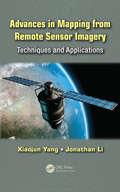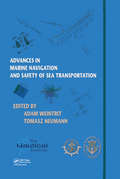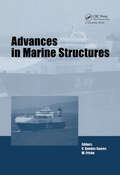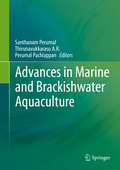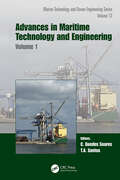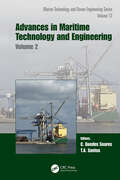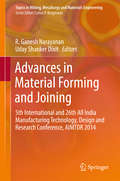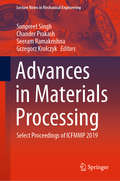- Table View
- List View
Advances in Mapping from Remote Sensor Imagery: Techniques and Applications
by Xiaojun Yang Jonathan LiAdvances in Mapping from Remote Sensor Imagery: Techniques and Applications reviews some of the latest developments in remote sensing and information extraction techniques applicable to topographic and thematic mapping. Providing an interdisciplinary perspective, leading experts from around the world have contributed chapters examining state-of-the
Advances in Marine Navigation and Safety of Sea Transportation: Advances In Marine Navigation
by Adam Weintrit Tomasz NeumannThis volume contains a selection of papers presented at the 13th International Conference on Marina Navigation and Safety of Sea Transport and is addressed to scientists and professionals in order to share their expert knowledge, experience and research results concerning all aspects of navigation, safety of navigation and sea transportation. The Thirteen Edition of the most innovative World conference on maritime transport research is designed to find solutions to challenges in waterborne transport, navigation and shipping, mobility of people and goods with respect to energy, infrastructure, environment, safety and security as well as to economic issues.
Advances in Marine Structures
by C. Guedes SoaresThis collection of papers addresses various aspects related to design analysis of marine structures, including: Methods and Tools for Loads and Load Effects; Methods and Tools for Strength Assessment; Experimental Analysis of Structures; Materials and Fabrication of Structures; Methods and Tools for Structural Design and Optimisation; and Structural Reliability, Safety and Environmental Protection.The book will appeal to academia, research organizations, classification societies, shipyards, ship design offices, governmental bodies, consultants, and shipowners.
Advances in Marine Vertebrate Research in Latin America: Technological Innovation and Conservation (Coastal Research Library #22)
by Charles W. Finkl Marcos R. Rossi-SantosThis book gathers the most recent research findings on ecology and conservation of marine vertebrates in Latin America, making use of high technological methods to show readers the diversity of the marine research that has been conducted in these countries over the last decades. The book brings authors from more than 23 institutions of 7 different countries developing the most diverse research aiming at ocean conservation through the ecology of different vertebrate animals, such as whales, dolphins, manatees, turtles, seabirds and fish. This book deals with technological advances and innovation in the ecology and conservation of marine vertebrates in Latin America. This eclectic collection is broad in scope but provides detailed summaries of new methods that are deployed in the study of marine environmental conservation. Key issues revolve around the development and application of educational methodologies in the field of marine vertebrate research, which provide a rational basis for better management of marine environments using modern techniques associated with GIS, satellite tracking, aerial systems, bioacoustics, biogeochemistry, genetics, underwater videography, species photoidentification, molecular biology, trophic ecological methods, ethological methods, and behavioural ecology, among others. Discussion and elucidation of these kinds of techniques are aimed at university-level students and post-graduate researchers. The scope of this volume includes whales, sharks, rays, dolphins, tropical fishes, turtles, manatees as well as aspects of Latin American marine ecosystem conservation. Researchers in this biogeographic region, as well as others involved with marine vertebrate research, will find this work essential reading.
Advances in Marine and Brackishwater Aquaculture
by Santhanam Perumal Thirunavukkarasu A. R. Perumal PachiappanThis book compiles the latest findings in the field of marine and brackishwater aquaculture. It covers significant topics such as techniques of culture of live feeds (microalgae, rotifer, Artemia, marine copepod & polychaetes), while also highlighting vital themes like the culture and applications of free and marine sponge associated microbial probiotics, controlled breeding, seed production and culture of commercially important fin and shell fishes. Moreover, the book focuses on the breeding and culture of marine ornamental fishes, sea cucumber and sea urchin and discusses seaweeds culture, aqua feed formulation and nutrition, water quality management in hatchery and grow-out culture systems, fish disease diagnosis and health management and cryopreservation of fish gametes for sustainable aquaculture practices, all from a multidimensional perspective. The global fish production was 154 million tonnes in 2011 which more or less consisted of capture and culture fisheries (FAO, 2012). Roughly 80% of this is from inland-freshwater aquaculture and the remainder from capture fisheries in the marine and brackishwater sector. However, marine and brackishwater catches have recently begun to diminish due to overexploitation, climate change and pollution. The UNEP report affirmed that if the world remains on its current course of overfishing, by 2050, the ocean fish stock could become extinct or no longer commercially viable to exploit. In these circumstances, aquaculture is considered to be a promising sector to fulfill our future protein requirement. However, brackishwater and marine fish production now face serious challenges due to e. g. lack of quality fish seeds, feeds, poor water quality management and diseases. Fisheries and aquaculture sectors play a vital role as potential sources of nutritional security and food safety around the globe. Fish food is rich in protein, vitamins, phosphorous, calcium, zinc, selenium etc. In addition, fish contains omega-3 fatty acids, which help to prevent cardiovascular diseases. Fish food can also provide several health benefits to consumers. The omega 3 fatty acids found in fish can reduce the levels of LDL cholesterol (the "bad" cholesterol) and increase the HDL levels (the "good" cholesterol). Research conducted in Australia has proved that fish consumption can be used to cure hypertension and obesity. It is also reported that people who ate more fish were less prone to asthma and were able to breathe more easily. Omega 3 fish oil or fish consumption can help to prevent three of the most common forms of cancer: breast cancer, colon and prostate cancer. The omega 3 fatty acids present in fish or fish oil induce faster hair growth and prevent hair loss. Since most varieties of fish are rich in protein, eating fish helps to keep hair healthy. Furthermore, fish or fish oil helps in improving the condition of dry skin, giving it a healthy glow. It is useful in treating various skin problems such as eczema, psoriasis, itching, redness of skin, skin lesions and rashes. It is well known that eating fish improves vision and prevents Alzheimer''s and type-2 diabetes, and can combat arthritis. Further, fish oil or fish is good for pregnant women, as the DHA present in it helps in the development of the baby''s eyes and brain. It helps to avoid premature births, low birth weights and miscarriages. In addition, it is widely known that fish can be a good substitute for pulses in cereal-based diets for the poor. The global fish production was roughly 154 million tonnes in 2011 (FAO, 2012). It is estimated that by 2020 global fish requirements will be over 200 million tonnes; as such, innovative technological improvements are called for in order to improve the production and productivity in fisheries. In this context, this book provides valuable information for academics, scientists, researchers, government officials and farmers on innovative technological advances for sustainable fish production using aquaculture methods. The book identifies the main issues and trends ...
Advances in Maritime Technology and Engineering: Volume 1 (Proceedings in Marine Technology and Ocean Engineering)
by C. Guedes SoaresAdvances in Maritime Technology and Engineering comprises a collection of the papers presented at the 7th International Conference on Maritime Technology and Engineering (MARTECH 2024) held in Lisbon, Portugal, on 14-16 May 2024. This Conference has evolved from the series of biannual national conferences in Portugal, which have become an international event, reflecting the internationalization of the maritime sector and its activities. MARTECH 2024 is the seventh of this new series of biannual conferences. This book comprises 142 contributions that were reviewed by an International Scientific Committee.Advances in Maritime Technology and Engineering is dedicated to maritime transportation, ports as well as maritime safety and reliability. It further comprises sections dedicated to ship design, cruise ship design, and to the structural aspects of ship design, such as ultimate strength and composites, subsea structures as pipelines, and to ship building and ship repair.The Proceedings in Marine Technology and Ocean Engineering series is dedicated to the publication of proceedings of peer-reviewed international conferences dealing with various aspects of “Marine Technology and Ocean Engineering”. The series includes the proceedings of the following conferences: the International Maritime Association of the Mediterranean (IMAM) conferences, the Marine Structures (MARSTRUCT) conferences, the Renewable Energies Offshore (RENEW) conferences and the Maritime Technology (MARTECH) conferences. The “Marine Technology and Ocean Engineering” series is also open to new conferences that cover topics on the sustainable exploration of marine resources in various fields, such as maritime transport and ports, usage of the ocean including coastal areas, nautical activities, the exploration and exploitation of mineral resources, the protection of the marine environment and is resources, and risk analysis, safety and reliability. The aim of the series is to stimulate advanced education and training through the wide dissemination of the results of scientific research.
Advances in Maritime Technology and Engineering: Volume 2 (Proceedings in Marine Technology and Ocean Engineering)
by C. Guedes SoaresAdvances in Maritime Technology and Engineering comprises a collection of the papers presented at the 7th International Conference on Maritime Technology and Engineering (MARTECH 2024) held in Lisbon, Portugal, on 14-16 May 2024. This Conference has evolved from the series of biannual national conferences in Portugal, which have become an international event, reflecting the internationalization of the maritime sector and its activities. MARTECH 2024 is the seventh of this new series of biannual conferences. This book comprises 142 contributions that were reviewed by an International Scientific Committee.Advances in Maritime Technology and Engineering is dedicated to maritime transportation, ports as well as maritime safety and reliability. It further comprises sections dedicated to ship design, cruise ship design, and to the structural aspects of ship design, such as ultimate strength and composites, subsea structures as pipelines, and to ship building and ship repair.The Proceedings in Marine Technology and Ocean Engineering series is dedicated to the publication of proceedings of peer-reviewed international conferences dealing with various aspects of “Marine Technology and Ocean Engineering”. The series includes the proceedings of the following conferences: the International Maritime Association of the Mediterranean (IMAM) conferences, the Marine Structures (MARSTRUCT) conferences, the Renewable Energies Offshore (RENEW) conferences and the Maritime Technology (MARTECH) conferences. The “Marine Technology and Ocean Engineering” series is also open to new conferences that cover topics on the sustainable exploration of marine resources in various fields, such as maritime transport and ports, usage of the ocean including coastal areas, nautical activities, the exploration and exploitation of mineral resources, the protection of the marine environment and is resources, and risk analysis, safety and reliability. The aim of the series is to stimulate advanced education and training through the wide dissemination of the results of scientific research.
Advances in Material Forming and Joining: 5th International and 26th All India Manufacturing Technology, Design and Research Conference, AIMTDR 2014 (Topics in Mining, Metallurgy and Materials Engineering)
by Uday Shanker Dixit R. Ganesh NarayananThis edited book contains extended research papers from AIMTDR 2014. This includes recent research work in the fields of friction stir welding, sheet forming, joining and forming, modeling and simulation, efficient prediction strategies, micro-manufacturing, sustainable and green manufacturing issues etc. This will prove useful to students, researchers and practitioners in the field of materials forming and manufacturing.
Advances in Material Property Characterization using Small Punch Tests
by Bijan Kumar DuttaThe small punch test (SPT) is useful to calculate changes in the tensile and fracture properties of structural materials during the service life of the materials of plant components. This book compiles advances in the development of correlations to calculate mechanical properties of the materials using SPT data. New correlations have been developed using hybrid methodology involving analytical and experimental data. The newly developed correlations have been tested conducting case studies on SPT and pre- cracked/ notched SPT (p- SPT) specimens. The eventual applications of all the new correlations have been demonstrated by conducting a real- life case study involving degradation of structural material from ductile to semi- brittle state due to aging.Features:• Presents exclusive material on the remnant life assessment of in- service materials using SPTs.• Assesses the fracture toughness of ductile materials using the experimentally measured biaxial fracture strain.• Provides new equations to calculate the yield and ultimate stresses of copper and titanium alloys using measured SPT data.• Explores functions to correlate the load- displacement data of p- SPT specimens with fracture properties.• Includes case studies with direct relevance to the degradation of plant materials.This book is aimed at researchers, professionals, and graduate students in materials science and engineering, mechanical property characterization and testing, and small- scale experimentation. It is expected that the advanced methodology presented in this book to evaluate changes in the properties of aged materials during the service life using SPT data are useful to designers for safety evaluation and also to calculate the remaining service life of industrial components for life extension studies.
Advances in Material Science and Engineering: Selected Articles from ICMMPE 2021 (Lecture Notes in Mechanical Engineering)
by Mokhtar Awang Seyed Sattar Emamian Jeeferie Abd Razak Patrick J. MassetThis book highlights the recent research works on mechanical, manufacturing and plant engineering presented during the 7th International Conference on Mechanical, Manufacturing and Plant Engineering (ICMMPE 2021) held on 29th November 2021. It highlights the latest advances in the emerging areas, brings together researchers and professionals in the field and provides a valuable platform for exchanging ideas and fostering collaboration. Addressing real-world problems concerning joining technologies that are at the heart of various manufacturing sectors, the respective papers present the outcomes of the latest experimental and numerical work on problems in soldering, arc welding and solid-state joining technologies.
Advances in Material Science and Engineering: Selected Articles from ICMMPE 2022 (Proceedings in Technology Transfer)
by Mokhtar Awang Seyed Sattar Emamian Hussain H. Al-Kayiem Ton C. BorThis book highlights the recent research works on mechanical, manufacturing and plant engineering presented during the 8th International Conference on Mechanical, Manufacturing and Plant Engineering (ICMMPE 2022) held on November 24, 2022 in Kuala Lumpur, Malaysia. It highlights the latest advances in the emerging areas, brings together researchers and professionals in the field and provides a valuable platform for exchanging ideas and fostering collaboration. Addressing real-world problems concerning joining technologies that are at the heart of various manufacturing sectors, the respective papers present the outcomes of the latest experimental and numerical work on problems in soldering, arc welding and solid-state joining technologies.
Advances in Material Science and Engineering: Selected articles from ICMMPE 2020 (Lecture Notes in Mechanical Engineering)
by Mokhtar Awang Seyed Sattar EmamianThis book presents selected papers from the 6th International Conference on Mechanical, Manufacturing and Plant Engineering (ICMMPE 2020), held virtually via Google Meet. It highlights the latest advances in the emerging area, brings together researchers and professionals in the field and provides a valuable platform for exchanging ideas and fostering collaboration. Joining technologies could be changed to manufacturing technologies. Addressing real-world problems concerning joining technologies that are at the heart of various manufacturing sectors, the respective papers present the outcomes of the latest experimental and numerical work on problems in soldering, arc welding and solid-state joining technologies.
Advances in Material Science and Engineering: Selected articles from ICMMPE 2023, 16-Nov, Putrajaya, Malaysia (Proceedings in Technology Transfer)
by Mokhtar Awang Hussain H. Al-Kayiem Sattar S. EmamianThis book presents the latest research advancements in the field of material science, specifically in mechanical, manufacturing, and plant engineering. It includes peer reviewed articles from the 9th International Conference on Mechanical, Manufacturing and Plant Engineering (ICMMPE 2023) held on 16th November 2023 at The Everly Hotel Putrajaya, Malaysia. The conference showcases cutting-edge research and facilitates knowledge exchange among experts in the field of material science, mechanical engineering and their applications.
Advances in Material Science and Metallurgy: Select Proceedings Of Icfammt 2022 (Lecture Notes In Mechanical Engineering)
by Sunkulp Goel Bhingole Pramod P. Ulkesh B. DesaiThis book presents the select peer-reviewed proceedings of the International Conference on Futuristic Advancements in Materials, Manufacturing and Thermal Sciences (ICFAMMT 2022). It provides an overview of the latest research in the areas of fundamentals of material science and metallurgy, material processing, mechanical properties and material characterizations, composite materials, nanomaterials, applications of materials, advanced engineering materials, technologies for space, nuclear and aerospace applications, optimization of materials for required properties, resent trends in materials science and metallurgy. The book will be useful for researchers and professionals working in the field of material science and metallurgy.
Advances in Material Science and Metallurgy: Select Proceedings of ICFAMMT 2022 (Lecture Notes in Mechanical Engineering)
by Sunkulp Goel Bhingole Pramod P. Ulkesh B. DesaiThis book presents the select peer-reviewed proceedings of the International Conference on Futuristic Advancements in Materials, Manufacturing and Thermal Sciences (ICFAMMT 2022). It provides an overview of the latest research in the areas of fundamentals of material science and metallurgy, material processing, mechanical properties and material characterizations, composite materials, nanomaterials, applications of materials, advanced engineering materials, technologies for space, nuclear and aerospace applications, optimization of materials for required properties, resent trends in materials science and metallurgy. The book will be useful for researchers and professionals working in the field of material science and metallurgy.
Advances in Material Sciences and Engineering (Lecture Notes in Mechanical Engineering)
by Mokhtar Awang Seyed Sattar Emamian Farazila YusofThis book presents selected papers from the 4th International Conference on Mechanical, Manufacturing and Plant Engineering (ICMMPE 2018), which was held in Melaka, Malaysia from the 14th to the 15th of November 2018. The proceedings discuss genuine problems concerning joining technologies that are at the heart of various manufacturing sectors. In addition, they present the outcomes of experimental and numerical works addressing current problems in soldering, arc welding and solid-state joining technologies.
Advances in Materials Engineering and Manufacturing Processes: Select Proceedings of ICFTMM 2019 (Lecture Notes on Multidisciplinary Industrial Engineering)
by Inderdeep Singh Pramendra Kumar Bajpai Kuldeep PanwarThis book comprises select proceedings of the International Conference on Futuristic Trends in Materials and Manufacturing (ICFTMM) 2019. It covers latest findings and challenges in manufacturing processes and characterization of different advanced materials. Latest fabrication techniques of polymer based materials, biomaterials, and energy materials along with their practical applications are discussed. The contents also focus on cost-effective and energy-efficient sustainable and green manufacturing technologies. The contents of this book will be useful for students, researchers as well as industry professionals interested in characterization and fabrication of materials.
Advances in Materials Engineering: Select Proceedings of ICFAMMT 2024 (Lecture Notes in Mechanical Engineering)
by Ankit Sharma Pramod Bhingole Kamlesh Joshi Surya Deo YadavThe book presents select peer-reviewed proceedings of the International Conference on Futuristic Advancements in Materials, Manufacturing, and Thermal Sciences (ICFAMMT 2024). It covers latest research and developments in the field of material science and metallurgy. Various topics covered in this book are material processing, mechanical properties, and material characterisation, composite materials, nanomaterials, advanced engineering materials, and technologies for space, nuclear, and aerospace applications. The book also focuses on the optimisation of materials for required properties and recent trends in materials science and metallurgy. This book is of great value for researchers and professionals working in the field of material science and metallurgy.
Advances in Materials Processing and Manufacturing Applications: Proceedings of iCADMA 2020 (Lecture Notes in Mechanical Engineering)
by Amar Patnaik Ernst Kozeschnik Vikas KukshalThis book presents selected papers from the International Conference on Advances in Materials Processing and Manufacturing Applications (iCADMA 2020), held on November 5–6, 2020, at Malaviya National Institute of Technology, Jaipur, India. iCADMA 2020 proceedings is divided into four topical tracks – Advanced Materials, Materials Manufacturing and Processing, Engineering Optimization and Sustainable Development, and Tribology for Industrial Application.
Advances in Materials Processing: Proceedings Of Chinese Materials Conference 2017 (Lecture Notes In Mechanical Engineering)
by Yafang Han<P>This proceedings volume gathers selected papers presented at the Chinese Materials Conference 2017 (CMC2017), held in Yinchuan City, Ningxia, China, on July 06-12, 2017. <P> This book covers a wide range of material surface science, advanced preparation and processing technologies of materials, high purity materials, silicon purification technology, solidification science and technology, performance and structure safety of petroleum tubular goods and equipment materials, materials genomes, materials simulation, computation and design. <P> The Chinese Materials Conference (CMC) is the most important serial conference of the Chinese Materials Research Society (C-MRS) and has been held each year since the early 1990s. The 2017 installment included 37 Symposia covering four fields: Advances in energy and environmental materials; High performance structural materials; Fundamental research on materials; and Advanced functional materials. More than 5500 participants attended the congress, and the organizers received more than 700 technical papers. Based on the recommendations of symposium organizers and after peer reviewing, 490 papers have been included in the present proceedings, which showcase the latest original research results in the field of materials, achieved by more than 300 research groups at various universities and research institutes.
Advances in Materials Processing: Select Proceedings of ICFMMP 2019 (Lecture Notes in Mechanical Engineering)
by Seeram Ramakrishna Chander Prakash Sunpreet Singh Grzegorz KrolczykThis book presents the select proceedings of the International Conference on Functional Material, Manufacturing and Performances (ICFMMP) 2019. The book primarily covers recent research, theories, and practices relevant to surface engineering and processing of materials. It focuses on the lesser-known technologies and advanced manufacturing methods which may not be standardized yet but are highly beneficial to material and manufacturing industrial engineers. The book includes current advances in the field of coating, deposition, cladding, nanotechnology, surface finishing, precision machining, processing, and emerging advanced manufacturing technologies which enhance the performance of materials in terms of corrosion, wear and fatigue. The book can be a valuable reference for beginners, researchers, and professionals interested in materials processing and allied fields.
Advances in Materials Research: Select Proceedings of ICAMR 2019 (Springer Proceedings in Materials #5)
by N. Siva Shanmugam G. Kumaresan V. DhinakaranThis book comprises select peer-reviewed proceedings of the International Conference on Advances in Materials Research (ICAMR 2019). The contents cover latest research in materials and their applications relevant to composites, metals, alloys, polymers, energy and phase change. The indigenous properties of materials including mechanical, electrical, thermal, optical, chemical and biological functions are discussed. The book also elaborates the properties and performance enhancement and/or deterioration in order of the modifications in atomic particles and structure. This book will be useful for both students and professionals interested in the development and applications of advanced materials.
Advances in Materials Science and Engineering: Proceedings of the 7th Annual International Workshop on Materials Science and Engineering, (IWMSE 2021), Changsha, Hunan, China, 21-23 May 2021
by Domenico LombardoThis volume contains the selected papers resulting from the 7th Annual International Workshop on Materials Science and Engineering, and is focusing on the following six aspects: 1. Various Materials Properties, Processing, and Manufactures; 2. Multifunctional Materials Properties, Processing, and Manufactures; 3. Nanomaterials and Biomaterials; 4. Civil Materials and Sustainable Environment; 5. Electrochemical Valuation, Fracture Resistance, and Assessment; 6. Designs Related to Materials Science and Engineering. This proceeding presents and discusses key concepts and analyzes the state-of-the-art of the field. IWMSE 2021 is an academic conference in a series held once per year. The conference not only provides insights on materials science and engineering, but also affords conduit for future research in these fields. It provides opportunities for the delegates to exchange new ideas and application experiences, to establish business or research relations and to find global partners for future collaboration.
Advances in Materials Science and Engineering: Select Proceedings of ICFMMP 2019 (Lecture Notes in Mechanical Engineering)
by Chander Prakash B. S. Pabla Sunpret Singh Grzegorz KrolczykThis book presents the select proceedings of the International Conference on Functional Material, Manufacturing and Performances (ICFMMP) 2019. The book provides the state-of-the-art research, development, and commercial prospective of recent advances in materials science and engineering. The contents cover various synthesis and fabrication routes of functional and smart materials for applications in mechanical engineering, manufacturing, metrology, nanotechnology, physics, chemical and biological sciences, civil engineering, food science among others. It also provides the evolutionary behavior of materials science for industrial applications. This book will be a useful resource for researchers as well as professionals interested in the highly interdisciplinary field of materials science.
Advances in Materials Science and Technology
by Srikari Srinivasan Rahul M Cadambi R SureshThe field of materials science and engineering continues to evolve rapidly, driven by the need for innovative solutions across structural, energy, biomedical, and electronic applications. This book, comprising the proceedings of the International Conference on Advances in Materials Science and Technology (ICAMST-2024), brings together a curated selection of high-quality research papers that address current challenges and emerging trends in applied materials. It serves as a comprehensive resource for academicians, researchers, industry professionals, and students working at the forefront of materials development and application.
